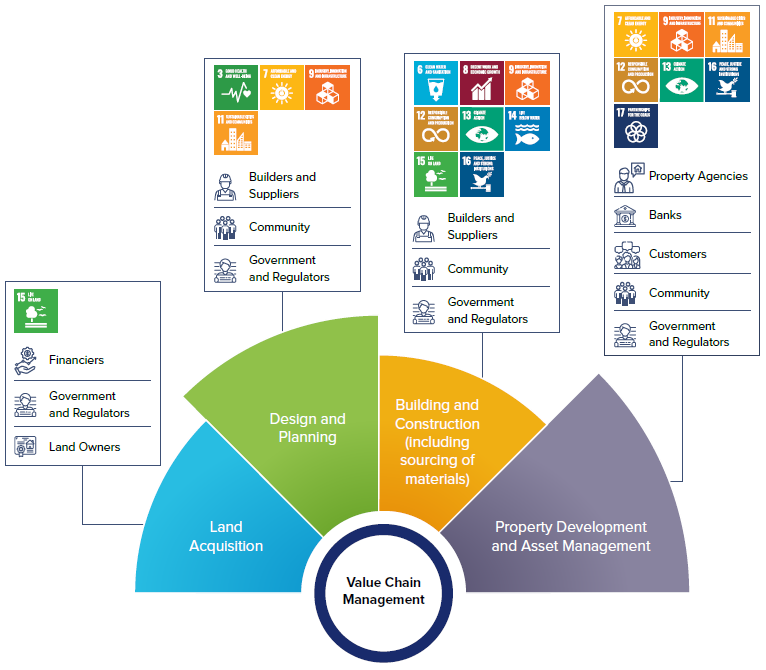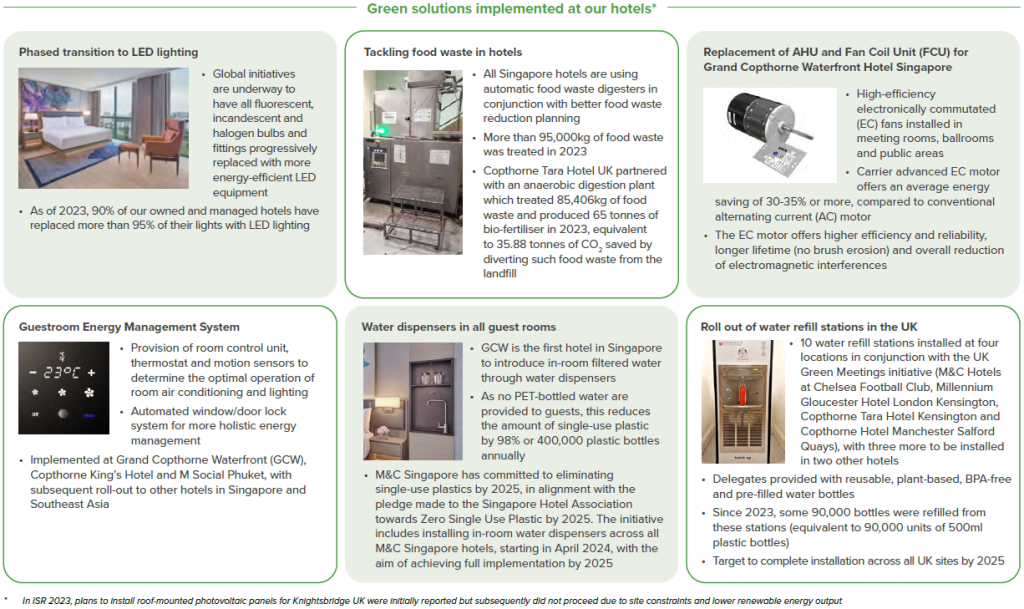INTEGRATING SUSTAINABILITY INTO OUR VALUE CHAIN
To catalyse the transition to a low carbon economy, the CDL Group is committed to engaging and influencing our ecosystem of stakeholders, including our investments and value chain to adopt more sustainable and innovative practices in alignment with global best practices.
We have identified key areas along our value chain where we can create positive ESG impact, referencing the UN Global Compact (UNGC) of Progress, “SDG Compass: The Guide for Business Action on the SDGs”, jointly developed by the GRI, UNGC, and World Business Council for Sustainable Development (WBCSD).
Leveraging our sphere of influence amongst stakeholders in the built environment, we apply our core competencies, invest in innovation, and engage our ecosystem to adapt to the fast-changing physical and regulatory challenges. Underlying this value chain process is proactive and continuous engagement with our internal and external stakeholders to support the global and national climate ambitions.

Global Alignment to Integrate Sustainability at the Group Level
As part of our efforts to integrate sustainability into our value chain, the Group has stepped up global alignment with M&C, our largest subsidiary by GHG emissions contribution. As part of the Group’s renewed SBTi-validated targets aligned with a 1.5oC warmer scenario, a new emissions reduction target of 58.8% under Scope 3 (Category 15: Investments) was introduced; impacting six key subsidiaries, including M&C.
As our key subsidiary and major contributor of total Group Scope 3 emissions,1 we worked closely with M&C in 2023 to identify further opportunities to reduce absolute emissions.2 M&C also established a target for all Singapore-based hotels to be Global Sustainable Tourism Council (GSTC)3-certified by 2025. With local M&C hotels certified as sustainable accommodation under GSTC, we will be compliant with the highest social and environmental standards in the market.
M&C implemented multi-pronged initiatives to enhance its sustainability commitment throughout 2023:
INNOVATION
- Implemented various engineering initiatives to increase operational productivity, energy- and cost-savings
- Implemented room control motion sensors units in four hotels
- Completed retrofitting of in-room water dispensers in one hotel
- Implemented use of robots in five Singapore hotels
- Collaborated with startups on emerging technologies such as cloud-based carbon footprinting and air flow optimisation
- Implemented AI Voice Assistant, which enhances hotel guests’ experience and reduces 15% of front desk’s workload
INVESTMENT
- On track to achieve GSTC certification for all Singapore-based hotels by Q2 2024
- Continued progress with obtaining green certifications across different regions
– 14 hotels in the UK obtained Green Tourism
– 4 hotels in New York obtained Green Key Global - Started construction of a new hotel in California with planned solar roof and other green technologies
- Executed high energy-efficient retrofits across assets
- Improved guestroom energy management system with an ecosystem-centric energy monitoring software
- Invested in robots for cleaning and serving in Singapore hotels
INTEGRATION
- Established a Sustainability Committee at M&C Group level with senior members from different regions and departments
- Created Sustainability Management System incorporating Group-wide policies
- Enhanced communication with external stakeholders through periodic updates on M&C’s dedicated webpage on sustainability efforts
- Conducted gap analysis of engineering initiatives across sites to identify further potential energy and sustainability improvement projects
IMPACT
- Avoided consumption of 300,000 plastic PET bottles
- Use of robots resulted in over 24-36% average man-hour savings daily, and approximately 1,855 total hours saved monthly
- Ongoing promotion of sustainability practices and behaviours have reduced utility consumption, encouraged positive behaviour and attitude towards energy conservation and implemented good energy management practices
| 1 | Based on publicly disclosure data from 2016-2020 |
| 2 | In 2019, M&C established its SBTi-validated target to reduce the Group’s carbon emission by 27% by 2030. The 2°C aligned target aims at absolute emissions reduction of 27% for owned and managed hotels under Scope 1, 2 and 3, from a 2017 base year |
| 3 | GSTC criteria serve as the global standards for sustainability in travel and tourism. The criteria are used for education and awareness-raising, policy-making for businesses and government agencies and other organisation types, measurement and evaluation, and as a basis for certification. It covers sustainable management, socioeconomic impacts, cultural impacts and environmental impacts |
